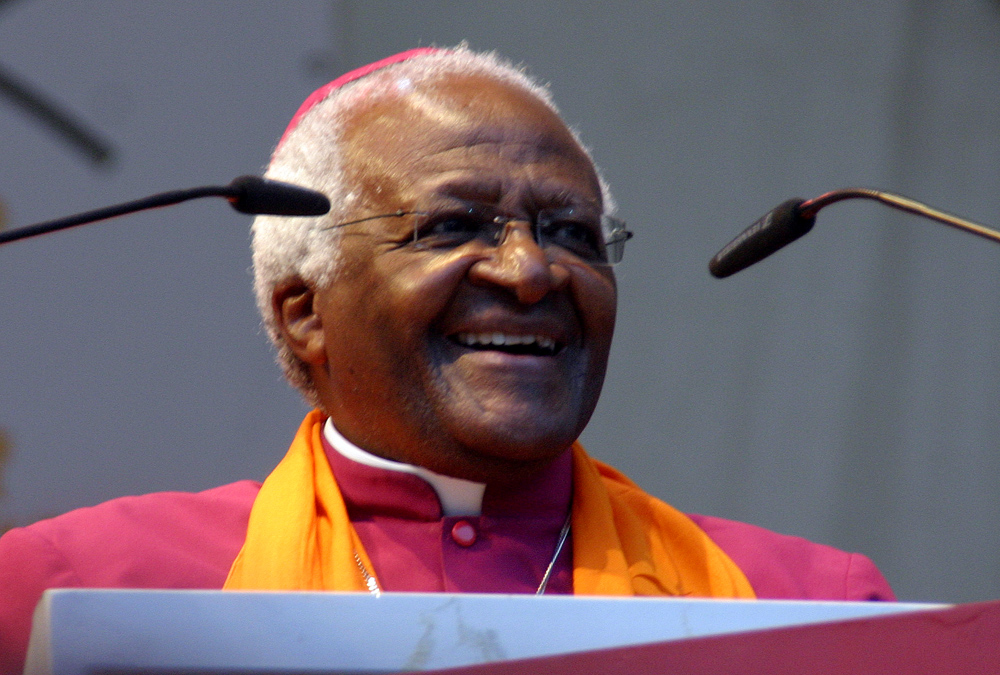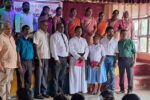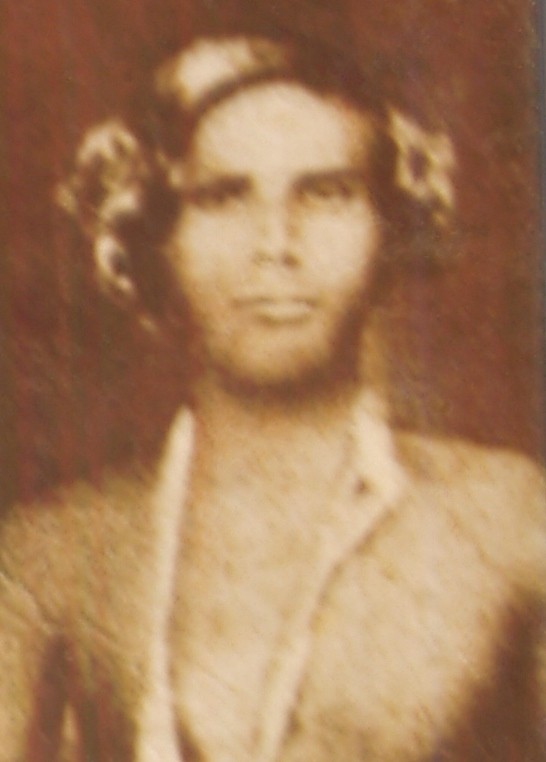FROM APARTHEID TO DEMOCRACY: DEMISE OF A MORAL GIANT

As the year 2021 was drawing to its end, the world bemoaned the passing away of a global celebrity and a spiritual icon of exceptional calibre: Archbishop Desmond Tutu of South Africa who used his spirited homilies at the pulpit to abolish apartheid, a system of racial discrimination and segregation, enforced by the white minority against the black majority of the country. His name will go down in the annals of human history as moral conscience, not only of South Africa, but of the world at large.
Archbishop Desmond Mpilo Tutu, South African Anglican churchman, theologian, politician, anti-apartheid and human rights activist and Nobel Peace Prize laureate, passed away on 26th December last year (the day after Christmas) at the Oasis Frail Care Centre in Cape Town at the age of 90. The cleric was suffering from cancer.
Tutu was born of a mixed Xhosa and Motswana descent to a poor family in Klerksdorp (the first capital of the then Transvaal Republic) in northwestern South Africa on 07th October 1931. Tutu later said that although they were not affluent, they were not destitute either. He was trained as a teacher and in 1955 he married Nomalizo Leah Shenxane, a Roman Catholic and a friend of his sister, fathering four children. Respecting the faith of his wife, Tutu agreed to hold a Roman Catholic wedding ceremony at the Church of Mary Queen of Apostles.
In 1960, Tutu was ordained an Anglican priest. Although he had been baptised into the Methodist Church in 1932, he later changed his original denomination, becoming a member of the Anglican Church. From 1978 to 1985, Tutu served as general secretary of the South African Council of Churches and from 1986 to 1996, as Archbishop of Cape Town. During the early 1970s, Tutu’s discovery of liberation theology and his attraction to black theology brought about a shift in his theological concepts. He equally sought to fuse concepts from black theology with African theology.
Liberation theology, a new form of Christian theology, developed mainly by Latin American Roman Catholic theologians, emphasises liberation from social, political and economic oppression as an anticipation of ultimate salvation, and preferential option for the poor. Dominican priest Gustavo Gutiérrez Merino of Peru, ex-Franciscan priest Leonardo Boff of Brazil, Jesuit priests Juan Luis Segundo of Uruguay and Jon Sobrino from Spain, are among the founders of this theology. Black theology originated among African-American seminarians and scholars while African theology is based on the African cultural context.
Inspired by these different forms of theology, Tutu became a tireless and vehement campaigner against apartheid (meaning “Separateness” in Afrikaans language), which was a system of racial stratification enforced by the white minority regime against the black majority in South Africa. Under this institutionalised racial segregation that prevailed from the late 1940s until the early 1990s, the white citizens enjoyed the highest social status while the black Africans were relegated to the lowest class.
Archbishop Tutu, who has always seen himself as the moral voice and conscience of South Africa, could not tolerate this racially biased system and fought hand in hand with Nelson Mandela (1918-2013) and the ANC (African National Congress) which Mandela had joined in 1944, to dismantle it and bring about racial reconciliation. Mandela was another anti-apartheid revolutionary who was imprisoned and on being released after 27 years in 1990, became the first black president of South Africa in a democratically held election in 1994. Both Tutu and Mandela received Nobel Peace Prizes in 1984 and 1993 respectively, in recognition of their struggle to abolish apartheid. Both were recipients of many other awards as well. Tutu was the second South African to receive the peace award, after Albert John Luthuli in 1960 for his non-violent role against apartheid.
Mandela selected Tutu to chair the Truth and Reconciliation Commission in his coalition government to investigate past human rights abuses committed by both pro and anti-apartheid groups. Tutu was also credited with coining the term “Rainbow Nation” to describe the ethnic mix of post-apartheid South Africa.
Tutu described his friend Mandela as a “nation builder” but was later increasingly disillusioned with the post-apartheid ANC due to its factionalism and corruption. He dared to criticise Mandela on several points, such as his tendency to wear brightly coloured Madiba shirts, regarding them as inappropriate. He was also critical of the other succeeding presidents Thabo Mbeki and Jacob Zuma. It was said that the Anglican prelate was deeply concerned about the squandering of many hard-won achievements of liberation and therefore he welcomed the formation of the opposition party Agang South Africa which challenged the governing ANC in the 2014 and 2019 general elections. But, in 2019 this opposition party was defeated, losing all its seats.
Tutu’s attitude towards same-sex marriages
He was quite outspoken in his opinion on gay rights. According to a canon of a cathedral, Tutu has become a hero all over the world for the LGBT (Lesbian, Gay, Bisexual, Transgender) community. The valiant and controversial stance he took as an influential cleric on the rights of this community sounds “groundbreaking” and “rebellious” in view of the prohibition of same-sex marriages in the Christian churches. His speeches and homilies lamented discrimination against homosexuals which he regarded as being equivalent to discrimination against black people and women. In 2007, Tutu accused the church of being obsessed with homosexuality and he went even further by saying that if God, as said, was homophobic, he would not worship that God. In 2011, Tutu called on the Anglican Church of South Africa to accept and conduct same-sex marriages. In 2015, he attended the marriage of his daughter Mpho Andrea Tutu, Anglican priest and activist, to another woman in the Netherlands and gave his blessing in spite of Anglican opposition to such marriages.
Same-sex marriages date back to the 1st century. In our era same-sex couples were legally acknowledged for the first time in the Netherlands in 2001. As of 2021, these marriages are legally performed and recognised in 29 countries, the most recent being Costa Rica (2020). Following a referendum held in September 2021, resulting in a 64% vote in favour of such marriages, Switzerland is to allow same-sex couples to marry starting from July this year.
His concern for social and international issues
Tutu, a personage easily identifiable in his purple robe, bravely championed the equality of all people and transformed the church by ordaining women to the priesthood. He spoke in support of voluntary euthanasia or assisted dying when a patient’s life is ended at his request to relieve him of further suffering. Tutu advocated non-violent protest and foreign economic pressure to bring about universal suffrage. Insisting on the urgent need to act against HIV/AIDS, with the 2005 election of Pope Benedict XVI, who was known for his conservative views on gender and sexuality issues, Tutu regretted that the Roman Catholic Church was now unlikely to change its opposition to the use of condoms to help prevent the disease. In 2006, he launched a global campaign to combat child trafficking, ensuring that all children are registered at birth.
Way back in the 1960’s Tutu decried the widespread corruption and poverty in Zaire (Democratic Republic of the Congo) under the regime of its president Mobutu Sese Seko (1965-1997). He expressed concern for the crushing of the Republic of Biafra, a secessionist state that existed in southeastern Nigeria from 1967-1970, predominantly populated by Igbo people. In his travels around East Africa in 1972, Tutu witnessed the expulsion of the Asian minority of Uganda by its military dictator Idi Amin Dada who gave them 90 days to leave the country.
He stood for the cause of Palestinians in the Israeli-Palestinian conflict, admitting, however, the right of Israel to exist. In 1989, at the invitation of Palestinian Anglican bishop Samir Kafity, he went on a Christmas pilgrimage to Jerusalem and giving a sermon near Bethlehem, he called for a two-state solution. Tutu laid a wreath at the Yad Vashem Holocaust Memorial and exhorted the people to forgive the Nazi perpetrators of this massacre, drawing criticism from Jewish groups around the world.
In July 1995, Tutu visited Rwanda, a year after the genocide during the Rwandan Civil War. He preached to 10,000 people in Kigali, the capital and called for justice with mercy towards the Hutus who had orchestrated the genocide.
He opposed the Iraq War (2003-2011) that broke out with the U. S.-led invasion of Iraq which overthrew the government of Saddam Hussein. When in 2009 Tutu was awarded the highest civilian honour at the White House by Barack Obama, Tutu asked the president to apologise for that invasion.
In 2005, Tutu declared that the detentions of terrorist suspects at Camp X-Ray at Guantánamo Bay in Cuba without trial were utterly unacceptable.
When protests and demonstrations were held in 2008 by monks in Lhasa, the capital of Tibet, over the Chinese government’s persecution of Tibetans, Tutu marched in a pro-Tibet demonstration in San Francisco, calling the world leaders to boycott the 2008 Summer Olympics opening ceremony in Beijing. Although Tutu invited the current Dalai Lama, the highest spiritual leader of Tibetan Buddhists, to attend his 80th birthday in 2011, the South African authorities did not grant him entry. Observers suggested that the government did not want to offend the People’s Republic of China, a major trading partner.
In August 2017, Tutu urged the Saudi Arabian government to stop the execution of 14 participants in the 2011-12 protests in the country. In September Tutu asked Myanmar’s leader Aung San Suu Kyi, another Nobel Peace Prize laureate (1991) to halt the army’s persecution of the country’s Muslim Rohingya minority. In December of the same year, Tutu condemned the decision of U. S. President Donald Trump to officially recognise Jerusalem as Israel’s capital despite Palestinian opposition.
Tutu was often compared in the United States to the civil rights activist and American Baptist minister Martin Luther King Jr. (1929-1968) although some white conservatives have lambasted him as an alleged communist sympathiser. But Tutu, though identified with socialism, opposed its other forms like Marxism-Leninism, as it promoted communism which advocates atheism. Tutu was a devout Christian from boyhood and prayer was part and parcel of his life. Being a spellbinding preacher, he was a fan of cricket as well, and was fond of reading books on politics and religion, and listening to classical music.
But some argue that his stand on social issues like the use of condoms for safe sexual relations and sexual acts between the same gender is debatable and they question whether these practices, which the Catholic Church, in general, does not favour, can be reconciled with the established Christian teachings on morality. Pope Francis, head of the Catholic Church, lamented Tutu’s demise and lauded him for promoting racial equality and reconciliation in his native South Africa. In 1987, Tutu received the Pacem in Terris (Peace on Earth) Catholic Award, named after a 1963 encyclical letter by Pope John XXIII that exhorts all people of good will to secure peace among all nations.
Tutu maintained that religious leaders like himself should not be engaged in party politics and cited the cases of Methodist Bishop Abel Muzorewa (prime minister of Zimbabwe Rhodesia from 1979-1980), Ayatollah Ruhollah Khomeini (1900-1989), founder of the Islamic Republic of Iran in 1979 and Archbishop Makarios III (1913-1977) of the Church of Cyprus and also the first president of that country. According to Tutu, such crossovers have proved problematic.
Tutu’s concern for Sri Lanka
On 18th May 2010, exactly a year after the end of the over 30-year-long ethnic war in Sri Lanka, Tutu wrote that if Sri Lanka was to build a more inclusive and democratic state for all its ethnic communities, there should be an urgent need for a far-sighted political leadership, able to reach out to all communities and serve all its citizens.
The National Christian Council of Sri Lanka, in a message of condolences, said that Archbishop Tutu was a moral compass to South Africa’s transition from apartheid to democracy.
In the almost empty St. George’s Cathedral in Cape Town, with an unvarnished, rope-handled plain pine coffin, placed before the altar, the countrymen bid farewell on 01st January to Archbishop Desmond Tutu whom they hailed as a hero, after a week-long period of national mourning, with no ostentatiousness or lavish spending as the prelate had wished. Pandemic regulations limited attendance to 100, discouraging mourners outside in a rain-soaked Cape Town. No speeches were delivered except for the eulogy given by South African President Cyril Ramaphosa. ***







